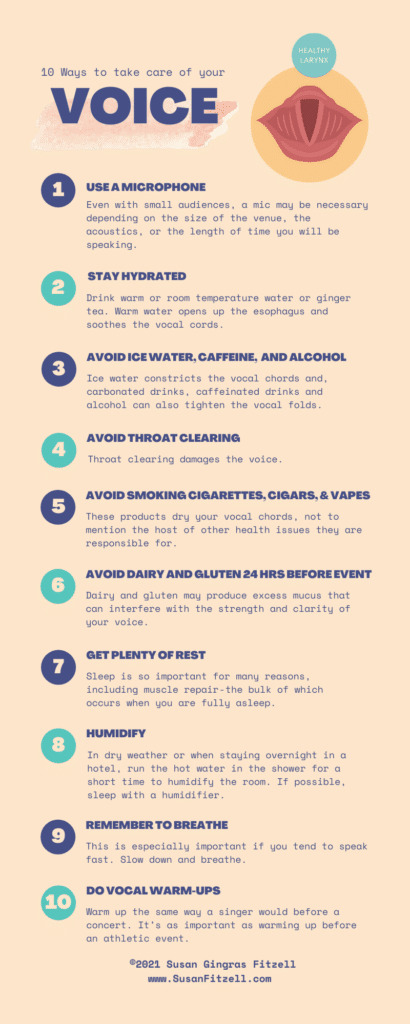I nearly lost my voice forever. Here’s how to prevent it from happening.

Several years ago, I found myself sitting in the office of an eye, ear, nose, and throat specialist, panicking. For over a year, I had suffered from laryngitis and other chronic voice issues. The doctor, knowing that I was a professional speaker, looked me straight in the eyes and said, “If you don’t start taking care of your voice, you will lose it.”
Most speakers never get formal voice training. Yet at some point in our lives, most of us will need to speak to a group, in a loud, clear, controlled voice — whether it’s as an executive at a conference, as a key stakeholder in a project meeting, or even as a volunteer youth soccer coach. Thanks to Zoom, many of us are speaking more frequently and longer than we ever have before — and that’s led to an increase in voice issues overall.
And if you decide to take the path of a professional speaker, the issue becomes an even bigger one. Just as it did with me.
We’re Abusing Our Voices
A few days after my visit with the doctor, I met with the voice therapist that he referred me to.
I described in detail my life as a professional speaker. I traveled all over the country for better than half the year speaking to groups both large and small. And after my presentations, I did an in-person visit and analysis at the school or business that I was working with — going from room to room, talking to people at all levels, and helping them improve their teaching and training skills with students and employees.
My services took multiple days to complete, and I talked The. Entire. Time.
Worse, I often spoke when the sound system was inadequate, or even did without a microphone altogether. At one venue, I had to speak for six hours without a microphone in an old classroom with a tile floor, no air conditioning, and an industrial-sized fan running constantly, that I had to try and speak over. Six hours of basically yelling to be heard by my audience.
And then I would get on a plane and a few hours later, repeat the process with another client and talk the entire time.
The therapist looked at me sternly. “You are committing voice abuse,” she said.
She explained that, just as singers must care for their voice, doing warm-up exercises before speaking, for example, speakers need to do the same. This is even more important if you are wearing a mask while you are speaking. While wearing a mask we may overcompensate and speak louder to enable others to hear us better.
The larynx and vocal chords, the tongue, the throat, the diaphragm — all the parts involved in speaking need to be strengthened and cared for just like we take care of the rest of our body. When we decide to get in shape, we don’t go to the gym and pick up the heaviest dumbbell on the rack. When we decide to take up jogging, we don’t run a marathon on day one! And even when we are in shape, we have to carefully warm up, cool down, and rest our muscles so that we can do progressively tougher workouts without getting injured.
My voice therapist laid out important steps for taking care of my voice. Without them, she said, I might have to retire from professional speaking.

10 steps for taking care of your voice
1. Use a microphone. Insisting on a mic to speak in school settings is one of the biggest challenges I face before an event. Many presenters don’t demand a mic and, consequently, reinforce the belief that one is not needed. It’s not unusual for clients to tell me that I am the first speaker to ever request a microphone.
Even with small audiences, a mic may be necessary depending on the size of the venue, the acoustics, or the length of time you will be speaking. Insist on having a mic available no matter what the event host tells you about the environment. If it truly is a small, intimate group and you don’t need a mic, then you don’t have to use it. However, if you need one and it’s not there, you are out of luck. Insist on a mic. Don’t back down.
2. Stay hydrated. Drink warm or room temperature water or ginger tea. Warm water opens up the esophagus and soothes the vocal cords. You can also add honey to your water. Start drinking water at least a half hour before you present; after you’ve started presenting, it’s too late. If you flew to the venue, make sure you drink plenty of water on the airplane.
3. Avoid ice water, caffeine, and alcohol. Ice water constricts the vocal chords, hindering the vibrations needed to produce sound. Carbonated drinks, caffeinated drinks and alcohol can also tighten the vocal folds. Avoid them before and during a presentation. Limit their consumption afterward.
4. Avoid throat clearing. My voice therapist explained that throat clearing damages the voice. She taught me how to flex the muscles in my throat to deal with the tickle. That technique is difficult to describe in print, but here’s a tip sheet that includes some good alternatives to throat clearing.
Another quick way to prevent throat clearing: Dr. Scott Shaffer, president of an ear, nose, and throat specialty center in Gibbsboro, New Jersey, suggests you scratch your ear. “When the nerves in the ear are stimulated, it creates a reflex in the throat that can cause a muscle spasm.” That spasm stops the tickle.
5. Avoid smoking cigarettes, cigars, and vapes. These products dry your vocal chords, not to mention the host of other health issues they are responsible for.
6. Avoid dairy and gluten products for at least 24 hours prior to a speaking engagement. Dairy and gluten may produce excess mucus that can interfere with the strength and clarity of your voice.
7. Get plenty of rest. Sleep is so important for many reasons, including muscle repair — the bulk of which occurs when you are fully asleep.
8. Humidify. In dry weather or when staying overnight in a hotel, run the hot water in the shower for a short time to humidify the room. If possible, sleep with a humidifier.
9. Remember to breathe. I used to try to cover so much content that I would speak fast. I barely took time to breathe! My speech therapist taught me this. And it was reinforced when I reviewed my speaker evaluations: quite a few attendees said that I delivered too much information too fast. I realized that there would be no winners if I didn’t slow down and stop to take a breath.
10. Do vocal warm-ups. Warm up the same way a singer would before a concert. It’s as important as warming up before an athletic event.
Voice Therapy Saved My Career
After spending a year in voice therapy, fortunately, I have rarely had any issues with my voice since.
If I start to feel some strain to my voice, I immediately go into critical care mode. You’ll never find me screaming at a sporting event or shouting over people to get attention. It’s not worth the risk to my voice.
Speaking in any capacity, even if you’re just gearing up to speak in a team meeting over Zoom, can be greatly enhanced by strengthening your voice and warming up a few minutes before you plan to speak.
Protect your voice as if it was gold — because it is.

